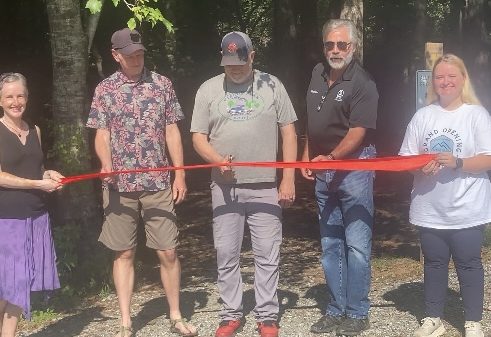First Friends of Farming breakfast draws 50; considers local grown food
Published 1:54 pm Tuesday, December 2, 2008
Just days after Polk County voters overwhelming turned down a referendum to fund farmland preservation in Polk County, about 50 farmers and farm supporters gathered recently for the first Friends of Farming Breakfast at the 4-H Center in Columbus.
Polk County Agricultural Economic Development Director Lynn Sprague, who organized the breakfast, plans to invite speakers to Friends of Farming breakfast events on a regular basis to raise awareness of the local farm economy and its growth potential.
Kate Slattery, Farm Outreach Specialist with the Appalachian Sustainable Agriculture Project (ASAP), was the speaker for the first breakfast. She cited statistics from a 2007 study done by ASAP and the USDA and talked about what ASAP is doing to make farms here sustainable.
Consumers across the country are now expressing strong preferences for locally grown foods&bsp; ‐ &dquo;local&dquo; is the new &dquo;organic,&dquo; Slattery said. Nonetheless, less than one percent of expenditures for food in the 23-county region ASAP serves is currently spent on locally grown food. The study estimated current spending on locally grown food at $14.5 million.
With effort to overcome obstacles in infrastructure for processing and delivery, consumer demand in Western North Carolina could support $451.9 million of purchases of locally-grown food, Slattery said, or 18 percent of total food spending by residents and visitors in the region.
If local consumers would target just $11 a week for local food, that goal would be reached, Slattery said.
ASAP has a number of programs aimed at tapping that potential, including marketing campaigns and farmer training opportunities. For instance, Slattery said former tobacco farmers need to learn a whole new set of marketing skills in order to grow and sell perishables.
ASAP lists all local growers and tailgate markets in its food guide, available in print and online.
In addition, the project offers an &dquo;Appalachian Grown Certification,&dquo; to assist consumers who have stated their willingness to pay more if they know the products are truly local.
Grocers often promote products as &dquo;local&dquo; which really come from the Southeast Region, often Florida, Slattery said. The ASAP &dquo;Appalachian Grown&dquo; certification is only awarded to foods grown within a 100-mile radius of Asheville, and on a family farm.
ASAP also promotes tailgate markets, school education programs and a &dquo;Mixing Bowl&dquo; program to match up farmers and restaurants.
While Western North Carolina represents 1/9th of the state population, the region is home to 1/4th of the state&squo;s farms, 12,000 family farms in all.
The amount of farmland in Western North Carolina has been steadily decreasing, down 12 percent from 1982 to 2002, Slattery said.
The number of farmers decreased from 76,065 in 1970 to 12,212 in 2002. The average age among farmers in Western North Carolina today is 56, she said.
Making sure that the local farm economy remains healthy is something that transcends politics, Slattery said.
&dquo;We see our bumper sticker, &squo;Local Food – Thousands of Miles Fresher,&squo; on cars with &squo;We Still Pray&squo; bumper stickers and &squo;Keep Asheville Weird,&dquo; stickers,&dquo; she said. &dquo;We all agree. Tourists are not coming here to look at golf courses. They love to drive through farmland. Farming is important to our economy and way of life.&dquo;
Among the attendees at the breakfast were a wide variety of Polk County farmers and their friends, including those representing turfgrass sod, cattle, grain, hay, organizers of a project to provide local produce to restaurant chefs in Charlotte, county commissioners, vendors of water tanks, cooperative extension, timber, conservation easement organizations, restaurant owners, dairy, organic produce stands, catering businesses and organic gardeners, Polk County&squo;s only Century Farm, plants and vegetables, beekeepers, and horse farmers.





